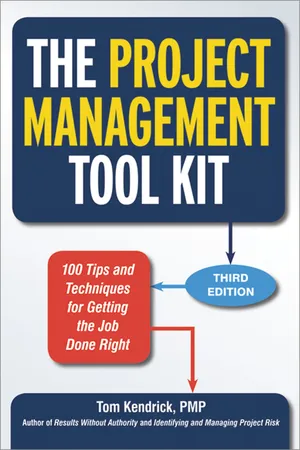
The Project Management Tool Kit
100 Tips and Techniques for Getting the Job Done Right
- 288 pages
- English
- ePUB (mobile friendly)
- Available on iOS & Android
About this book
This results-oriented resource is a must-have strategic partner for project managers of every industry.
Shifting priorities, budget cuts, unexpected interruptions….the obstacles that project managers face daily are sometimes relentless and always burdensome. Now, the average project is only growing more complicated.
The Project Management Tool Kit is filled with step-by-step guidance that will enable managers to complete even the most complex projects both on time and on budget. The book also offers 100 powerful, practical tips and techniques in a variety of areas, including:
- Scope planning
- Schedule development and adjustment
- Cost estimating and control
- Defining and using project metrics
- Decision-making and problem solving
- Motivation and leadership
- Stakeholder engagement and expectation management
- Risk identification and monitoring
Extensively updated and revised to reflect the latest changes to A Guide to the Project Management Body of Knowledge (PMBOK® Guide), the checklists, charts, examples, and tools for easy implementation in this invaluable resource will help project managers of all types tackle any challenge that comes their way.
Frequently asked questions
- Essential is ideal for learners and professionals who enjoy exploring a wide range of subjects. Access the Essential Library with 800,000+ trusted titles and best-sellers across business, personal growth, and the humanities. Includes unlimited reading time and Standard Read Aloud voice.
- Complete: Perfect for advanced learners and researchers needing full, unrestricted access. Unlock 1.4M+ books across hundreds of subjects, including academic and specialized titles. The Complete Plan also includes advanced features like Premium Read Aloud and Research Assistant.
Please note we cannot support devices running on iOS 13 and Android 7 or earlier. Learn more about using the app.
Information
Table of contents
- Cover Page
- Title Page
- Copyright Page
- Dedication
- Contents
- Introduction to the Third Edition
- 1. Activity Definition (PMBOK® Guide 6.2)
- 2. Activity Duration Estimating (PMBOK® Guide 6.5)
- 3. Activity Resource Estimating (PMBOK® Guide 6.4)
- 4. Activity Sequencing (PMBOK® Guide 6.3)
- 5. Brainstorming
- 6. Canceling Projects
- 7. Cause-and-Effect Analysis
- 8. Closing Projects (PMBOK® Guide 4.6)
- 9. Coaching and Mentoring
- 10. Communicating Informally
- 11. Communications Control (PMBOK® Guide 10.3)
- 12. Communications Management (PMBOK® Guide 10.2)
- 13. Communications Planning (PMBOK® Guide 10.1)
- 14. Conflict Resolution
- 15. Consensus-Building for Your Ideas
- 16. Constraint Management and Plan Optimization
- 17. Cost Budgeting (PMBOK® Guide 7.3)
- 18. Cost Control (PMBOK® Guide 7.4)
- 19. Cost Estimating (PMBOK® Guide 7.2)
- 20. Cost Planning (PMBOK® Guide 7.1)
- 21. Creative Problem-Solving
- 22. Customer Interviews
- 23. Decision-Making
- 24. Delegating Responsibility
- 25. Delphi Technique
- 26. Earned-Value Management (EVM)
- 27. Forecasting Project Completion
- 28. Global Teams
- 29. Human Resource Planning (PMBOK® Guide 9.1)
- 30. Influence Without Authority
- 31. Inheriting a Project
- 32. Integrated Change Control (PMBOK® Guide 4.5)
- 33. Issue Management
- 34. Leadership
- 35. Market Research
- 36. Matrix Teams (Cross-Functional Teams)
- 37. Meetings
- 38. Motivation
- 39. Multiple Dependent Projects
- 40. Multiple Independent Projects
- 41. Negotiating Contracts
- 42. Negotiating Project Changes
- 43. Organizational Change
- 44. Organizing for Project Management
- 45. Performance Problem Resolution
- 46. Presentations
- 47. Problem Escalation
- 48. Process Improvement
- 49. Procurement Close-Out (PMBOK® Guide 12.4)
- 50. Procurement Contracting (PMBOK® Guide 12.2)
- 51. Procurement Control (PMBOK® Guide 12.3)
- 52. Procurement Planning (PMBOK® Guide 12.1)
- 53. Project Baseline Setting
- 54. Project Charter (PMBOK® Guide 4.1)
- 55. Project Infrastructure
- 56. Project Initiation
- 57. Project Life Cycle
- 58. Project Metrics
- 59. Project Objective and Priorities
- 60. Project Office
- 61. Project Plan Development (PMBOK® Guide 4.2)
- 62. Project Plan Execution (PMBOK® Guide 4.3)
- 63. Project Reviews
- 64. Project Variance Analysis (PMBOK® Guide 4.4)
- 65. Project Vision
- 66. Qualitative Risk Analysis (PMBOK® Guide 11.3)
- 67. Quality Assurance (PMBOK® Guide 8.2)
- 68. Quality Control (PMBOK® Guide 8.3)
- 69. Quality Planning (PMBOK® Guide 8.1)
- 70. Quantitative Risk Analysis (PMBOK® Guide 11.4)
- 71. Required Skills Analysis
- 72. Requirements Collection (PMBOK® Guide 5.2)
- 73. Resource Leveling
- 74. Responsibility Analysis
- 75. Return On Investment Analysis
- 76. Rewards and Recognition
- 77. Risk Identification (PMBOK® Guide 11.2)
- 78. Risk-Management Planning (PMBOK® Guide 11.1)
- 79. Risk Monitoring and Control (PMBOK® Guide 11.6)
- 80. Risk Response Planning (PMBOK® Guide 11.5)
- 81. Schedule Control (PMBOK® Guide 6.7)
- 82. Schedule Development (PMBOK® Guide 6.6)
- 83. Schedule Planning (PMBOK® Guide 6.1)
- 84. Scope Change Control (PMBOK® Guide 5.6)
- 85. Scope Definition (PMBOK® Guide 5.3)
- 86. Scope Planning (PMBOK® Guide 5.1)
- 87. Scope Verification (PMBOK® Guide 5.5)
- 88. Software and Technical Tools for Project Management
- 89. Sponsorship
- 90. Stakeholder Engagement Control (PMBOK® Guide 13.4)
- 91. Stakeholder Engagement Management (PMBOK® Guide 13.3)
- 92. Stakeholder Identification (PMBOK® Guide 13.1)
- 93. Stakeholder Management Planning (PMBOK® Guide 13.2)
- 94. Start-Up Workshop
- 95. Status Collection
- 96. Team Acquisition (PMBOK® Guide 9.2)
- 97. Team Development (PMBOK® Guide 9.3)
- 98. Team Management (PMBOK® Guide 9.4)
- 99. Transitioning to Project Leadership
- 100. Work Breakdown Structure (PMBOK® Guide 5.4)
- Index